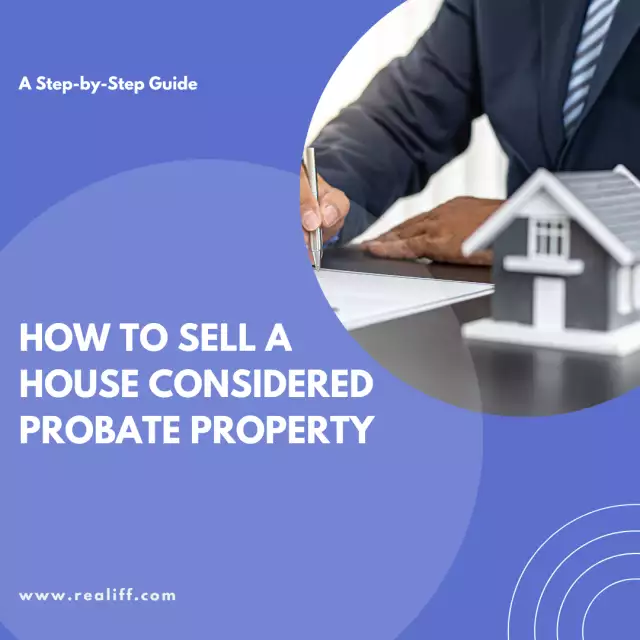A Step-by-Step Guide on How to Sell a House Considered Probate Property
A Step-by-Step Guide on How to Sell a House Considered Probate Property
Selling a housethat is considered probate property can be a complex and time-consuming process, but with the right guidance, it can be done efficiently and effectively. Probate property refers to a property that is part of the estate of a deceased person and is subject to probate court proceedings. Here is a guide on how to sell a house considered probate property:
Step 1: Obtain the Grant of Probate
When someone passes away, their assets, including property, become part of their estate. Probate is the legal process of dealing with a deceased person's estate, including distributing their assets and paying off any debts. The executor of the deceased person's will is responsible for managing the probate process.
To sell a property that is part of a deceased person's estate, the executor will need to obtain a grant of probate. The grant of probate is a legal document issued by the probate court that confirms the executor's authority to deal with the deceased person's estate, including the property. The grant of probate will be required by the buyer's solicitor as proof of the executor's authority to sell the property.
To obtain a grant of probate, the executor will need to apply to the probate court. The application will include details about the deceased person's estate, including their assets, debts, and beneficiaries. The application will also need to include the original will and any codicils (amendments) to the will. The executor may also need to provide other supporting documents, such as death certificates, as part of the application.
The probate court will review the application and, if everything is in order, will issue a grant of probate. Once the grant of probate has been issued, the executor will have the legal authority to deal with the deceased person's estate, including selling the property.
It is important to note that the process of obtaining a grant of probate can vary depending on the jurisdiction and the complexity of the estate. It is recommended to seek legal advice or work with a probate real estate agent who can guide you through the process and ensure that all the necessary steps are taken to obtain the grant of probate.
Step 2: Get a Probate Real Estate Agent
When selling a house considered probate property, it is highly recommended to work with a probate real estate agentwho has experience in dealing with these types of sales. Probate real estate agents are specialists who understand the unique challenges and requirements of selling a property that is part of a deceased person's estate.
A probate real estate agent can help you navigate the complex process of selling a probate property and can provide valuable guidance and support throughout the sale. They can help you understand the legal and financial aspects of selling a probate property and ensure that all the necessary steps are taken to comply with local laws and regulations.
Here are some of the benefits of working with a probate real estate agent:
- Experience and expertise:Probate real estate agents have extensive experience in dealing with probate sales and understand the nuances of the process. They can provide valuable insights into the local market, property values, and marketing strategies.
- Access to a network of professionals:Probate real estate agents typically have a network of professionals they can refer you to, including probate attorneys, appraisers, and home stagers. These professionals can help you navigate the process and ensure that the property is ready for sale.
- Time-saving:Selling a probate property can be a time-consuming process, and a probate real estate agent can help you save time by handling many of the tasks associated with the sale. They can handle property showings, marketing, negotiations, and paperwork, allowing you to focus on other aspects of the probate process.
- Maximize the sale price:A probate real estate agent can help you get the highest possible price for the property by using their expertise to market the property effectively and negotiate with potential buyers. This can help ensure that the estate receives the maximum value for the property.
Overall, working with a probate real estate agent can help you navigate the complex process of selling a probate property and ensure that the sale is completed legally and efficiently. It is recommended to interview several probate real estate agents and choose one who has experience in selling properties similar to yours and who you feel comfortable working with.
Step 3: Value the Property
An appraisalis an important step in the process of selling a house considered probate property. An appraisal is a professional assessment of the value of the property, and it is typically required by the probate court to ensure that the property is being sold for a fair price.
An appraisal is conducted by a licensed appraiser who will visit the property, inspect it, and take into consideration various factors that can affect its value, such as the location, size, condition, and any improvements or renovations that have been made. The appraiser will then compare the property to other similar properties in the area that have recently sold to determine its fair market value.
Here are some reasons why obtaining a property appraisal is important when selling a house considered probate property:
- Compliance with legal requirements:The probate court will typically require an appraisal to ensure that the property is being sold for a fair price and to protect the interests of the beneficiaries.
- Accurate pricing:An appraisal can help you determine the fair market value of the property, which can be useful in setting the sale price. Pricing the property too high can deter potential buyers while pricing it too low can result in a loss of value for the estate.
- Negotiation leverage:An appraisal can provide valuable leverage in negotiations with potential buyers, as it provides a solid basis for the asking price and can support your position in negotiations.
- Avoiding legal disputes:An appraisal can help avoid legal disputes that can arise if the property is sold for an unfair price, as it provides a professional assessment of the property's value that can be used to defend the sale price.
Overall, obtaining a property appraisal is an important step in the process of selling a house considered probate property. It is recommended to work with a qualified and licensed appraiser who has experience in appraising properties in the local market. The appraisal report should be shared with the probate court and potential buyers to ensure transparency and compliance with legal requirements.
Step 4: Obtain the Necessary Documents
Preparing a house considered probate property for sale is an essential step in the process. The property should be cleaned, decluttered, and staged to showcase its best features and appeal to potential buyers. Here are some important tasks to consider when preparing the property for sale:
- Cleaning and decluttering:The property should be thoroughly cleaned and decluttered to make it look spacious and inviting. This includes removing personal belongings, excess furniture, and any other items that can make the property look crowded or cluttered.
- Repairs and renovations:The property should be inspected for any necessary repairs and renovations. Any repairs that are needed should be completed, such as fixing leaks, repairing broken fixtures, and replacing damaged flooring. Renovations that can increase the property's value, such as updating the kitchen or bathroom, can also be considered.
- Staging:Staging is the process of setting up the property to showcase its best features and make it appealing to potential buyers. This includes arranging furniture, adding decorative items, and using neutral colors to create a welcoming and inviting atmosphere.
- Marketing:Once the property is ready for sale, it's time to market it to potential buyers. This includes creating high-quality photographs and virtual tours of the property, listing the property on multiple real estate websites, and using social media and other marketing channels to reach a wider audience.
- Open houses and property showings:Hosting open houses and property showings is an important part of the sales process. These events provide potential buyers with an opportunity to see the property in person and ask questions. It's important to ensure that the property is clean and well-maintained for these events.
Overall, preparing a house considered probate property for sale requires careful planning and attention to detail. Working with a probate real estate agent and other professionals, such as home stagers and contractors, can help ensure that the property is presented in the best possible light and attracts potential buyers.
Step 5: Prepare the Property for Sale
Listing a house considered probate property for sale is an important step in the process of selling it. This involves selecting a qualified and experienced probate real estate agent who can help market the property to potential buyers, negotiate offers, and ensure that the sale is completed in a timely and efficient manner.
Here are some important considerations when listing a house considered probate property for sale:
- Choosing a probate real estate agent:It's important to select a probate real estate agent who is familiar with the local market and has experience handling probate sales. Look for an agent who has a proven track record of success, is knowledgeable about the probate process, and can provide references from past clients.
- Setting a competitive price:Pricing the property correctly is critical to attracting potential buyers and maximizing the sale price. Your probate real estate agent can help you set a competitive price by conducting a market analysis, reviewing comparable sales in the area, and considering the property's unique features and condition.
- Creating a marketing plan:Your probate real estate agent should develop a comprehensive marketing plan to showcase the property to potential buyers. This may include creating a listing on multiple real estate websites, creating high-quality photographs and virtual tours of the property, and advertising the property through social media and other marketing channels.
- Showing the property to potential buyers:Your probate real estate agent will coordinate showings of the property to potential buyers. This may include hosting open houses or scheduling private showings. Your agent will also handle all communication with potential buyers and provide them with any necessary information about the property.
- Negotiating offers:Once you receive offers from potential buyers, your probate real estate agent will help you review and negotiate them. Your agent will help you consider the terms of the offers, such as the sale price, contingencies, and closing date, and negotiate with the buyer's agent to secure the best possible terms.
- Closing the sale:Once you accept an offer, your probate real estate agent will guide you through the closing process. This includes coordinating with the title company, ensuring that all necessary paperwork is completed and signed, and ensuring that the sale is completed in a timely and efficient manner.
Overall, listing a house considered probate property for sale requires the help of a qualified and experienced probate real estate agent. Your agent will help you set a competitive price, market the property to potential buyers, negotiate offers, and ensure that the sale is completed smoothly and efficiently.
Step 6: Market the Property
Closing the sale of a house considered probate property is the final step in the process of selling it. This involves transferring ownership of the property to the buyer and receiving payment for the sale. Here are some important considerations when closing the sale:
- Coordinate with the probate court:Before the sale can be completed, it's important to coordinate with the probate court to ensure that all necessary approvals are obtained. This may include obtaining court approval for the sale or providing the court with documentation showing that the sale was conducted under probate laws.
- Complete the necessary paperwork:Several documents need to be completed to close the sale of a house considered probate property. Your probate real estate agent or attorney can help ensure that all necessary documents are completed and signed, including the purchase agreement, transfer of ownership documents, and any other required forms.
- Coordinate with the title company:Your probate real estate agent will coordinate with the title company to ensure that the property's title is transferred to the buyer and that any outstanding liens or encumbrances are paid off.
- Receive payment:Once all necessary documents are signed and the title is transferred, the buyer will provide payment for the sale. This may be in the form of a cashier's check or wire transfer. Your probate real estate agent or attorney will help ensure that the payment is received and deposited into the appropriate account.
- Distribute proceeds:After receiving payment, the proceeds from the sale will need to be distributed according to the terms of the will or the court's instructions. This may involve paying off any outstanding debts or taxes, distributing the remaining proceeds to heirs, or transferring the funds into a trust.
- Close the estate:Once the sale is completed and the proceeds are distributed, the estate can be closed. This involves filing any necessary paperwork with the probate court and obtaining the court's approval to close the estate.
Overall, closing the sale of a house considered probate property requires careful coordination with the probate court, completion of the necessary paperwork, coordination with the title company, receiving payment, distributing proceeds, and closing the estate. Working with a qualified and experienced probate real estate agent and an attorney can help ensure that the sale is completed smoothly and efficiently.
Step 7: Negotiate and Accept an Offer
Transferring ownership of a house considered probate property to the buyer is a critical step in the process of selling it. This involves ensuring that all necessary legal requirements are met and that the property's title is transferred to the buyer in a timely and efficient manner. Here are some important considerations when transferring ownership:
- Verify legal requirements:Before transferring ownership of the property to the buyer, it's important to verify that all necessary legal requirements have been met. This may include obtaining court approval for the sale, providing documentation to the probate court showing that the sale was conducted following probate laws, and verifying that all outstanding debts and taxes have been paid.
- Prepare transfer documents:To transfer ownership of the property, a deed will need to be prepared that names the buyer as the new owner. Your probate real estate agent or attorney can help ensure that all necessary transfer documents are prepared correctly and that the transfer is completed following probate laws.
- Record the transfer:Once the transfer documents are prepared, they will need to be recorded with the appropriate county or municipal office. Your probate real estate agent or attorney can help ensure that the transfer is recorded correctly and that any necessary fees are paid.
- Coordinate with the title company:Your probate real estate agent will coordinate with the title company to ensure that the property's title is transferred to the buyer and that any outstanding liens or encumbrances are paid off. This will help ensure that the buyer receives a clear title to the property.
- Provide possession to the buyer:Once the title has been transferred, you will need to provide possession of the property to the buyer. This may involve coordinating with the buyer to schedule a move-in date and ensuring that the property is cleaned and ready for the buyer's occupancy.
Overall, transferring ownership of a house considered probate property to the buyer requires careful attention to legal requirements, preparation of transfer documents, recording the transfer, coordination with the title company, and providing possession to the buyer. Working with a qualified and experienced probate real estate agent and an attorney can help ensure that the transfer is completed smoothly and efficiently.
Step 8: Close the Sale
Resolving any outstanding issues is an important step in the process of selling a house considered probate property. This involves ensuring that all necessary repairs, clean-up, or other outstanding issues are addressed before the sale is finalized. Here are some important considerations when resolving outstanding issues:
- Property inspection:Before listing the property for sale, it's important to have it inspected by a qualified home inspector. This will help identify any outstanding issues with the property that need to be addressed before the sale can be completed.
- Repair and clean-up:Once the inspection is completed, any necessary repairs or clean-up should be completed before the property is listed for sale. This may include fixing leaks, repairing damaged areas, replacing broken fixtures, or cleaning the property.
- Address any liens or encumbrances:If there are any outstanding liens or encumbrances on the property, these will need to be addressed before the sale can be completed. This may involve paying off outstanding debts or negotiating with lien holders to release their claims on the property.
- Coordinate with the buyer:If any outstanding issues cannot be resolved before the sale, it's important to coordinate with the buyer to ensure that they are aware of these issues and are willing to proceed with the sale despite them.
- Obtain court approval:If any outstanding issues cannot be resolved, it may be necessary to obtain court approval for the sale. Your probate real estate agent or attorney can help you navigate this process and ensure that all necessary approvals are obtained.
Overall, resolving any outstanding issues is an important step in the process of selling a house considered probate property. By addressing any necessary repairs or clean-up, addressing any outstanding liens or encumbrances, and coordinating with the buyer, you can help ensure that the sale is completed smoothly and efficiently. Working with a qualified and experienced probate real estate agent and an attorney can help you identify any outstanding issues and ensure that they are addressed before the sale is finalized.
In conclusion, selling a house considered probate property can be a complex and challenging process, but with the right guidance and support, it can be done successfully. By following the steps outlined above, you can ensure that you get the highest possible price for the property and that the sale is completed legally and efficiently.






